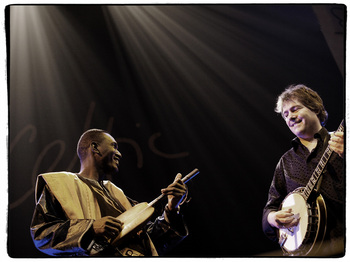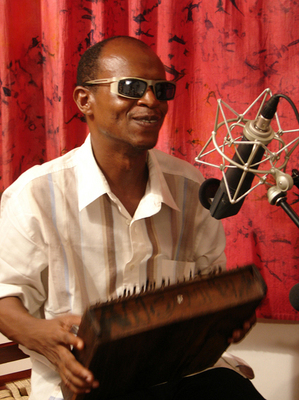Béla Fleck bringing ambitious Africa Project to Ann Arbor
A couple weeks ago, genre-bending banjo virtuoso Béla Fleck won 2 Grammy awards. Now, this in itself is not news. Fleck is so talented, creative and innovative that, over the last 15 or 20 years, it seems that almost every time he’s released an album, he’s won a Grammy: Fleck has taken home 13 of the statues to date.

Béla Fleck, right, and Malian musician Bassekou Kouyate.
And, such is his versatility, eclecticism and musical curiosity that he’s notched awards in a number of varied genres and categories — bluegrass, folk, pop, jazz, classical, Latin and more.
This year, though, he notched a win in a new category — or, at least, new for him: world music. At this year’s ceremony, Fleck won the statue for Best Contemporary World Music Album, for his ’09 release, “Throw Down Your Heart: Africa Sessions.” And he snagged another trophy for Best Pop Instrumental Performance for the disc’s title track.
The album is the aural document of what was probably Fleck’s most ambitious project to date: his month-long 2005 trip to Africa, for the purpose of exploring the roots of the banjo. An early version of the instrument indeed originated in Africa and came over to the United States during the early years of the slave trade. During his African trip, Fleck stopped in village after village, in several different African nations, to learn the regional styles and collaborate with musicians from Uganda, Tanzania, Senegal, Mali, South Africa and Madagascar.
PREVIEW |
And, being the musical alchemist he is, he infused his own sensibilities into the collaborations, sometimes yielding unique hybrids of American and African styles. The trip was also filmed and turned into a stirring documentary that chronicles the cultural exchanges he experienced every day. The movie, which bears the same title as the album, has won several awards and earned rave reviews from critics who used phrases like “profoundly moving” to describe its emotional and cultural impact.
But to know Fleck is to know that he wouldn’t be satisfied with just a CD and a documentary. He knew that he also had to bring this musical synergy to American audiences in a live setting. So, he and some of his new African musician friends have mounted a tour that comes to Hill Auditorium on Wednesday for a show sponsored by the University Musical Society.
“When I was over there, we were traveling so fast, and I was learning so many new songs, and recording them, that when I got back, I was so exhausted and overloaded that it was all a blur,” says Fleck. “I really didn’t remember anything I had learned. It wasn’t until I sat down and listened to the tapes again that I began remembering and re-learning what we’d done, and I thought it would be exciting to interact with some of these musicians live, onstage, for U.S. audiences.”
Joining Fleck on the tour will be some of the musicians who appeared on the CD and in the film — Bassekou Kouyate, Anania Ngoliga and John Kitime. Kouyate, from Mali, comes from a long line of Griot musicians, and plays the n’goni, the Malian banjo. He’ll be backed by his high-energy band, Ngoni Ba. (Their new album, “I Speak Fula” was just released February 2.)

Tanzanian vocalist and musician Anania Ngoliga joins Béla Fleck in his Africa Project.
Ngoliga, a blind singer and Tanzanian thumb-piano master, will be joined by on guitar by Kitime, also from Tanzania. Kitime has led the band Kilimanjaro for over 30 years and is steeped in the music of his native country.
When I spoke to Fleck, the day before the Grammys (January 31), he wasn’t exactly sure how the show would be structured — “because our first rehearsal is tomorrow,” he said with a laugh — a nod to the number of projects he’s juggling at any given time.
“But the way I think it will work is that Bassekou and his band will do their own set, and Anania and John will do their thing, and I’ll join each of them for a few tunes, then I’ll do a solo section. Then, I’ll get together with Bassekou and Anania to do a trio performance, which will feature a lot of improvising. And at the end, we’ll work up some stuff that we can all do together. By the time the tour gets to Ann Arbor, we’ll be really tight.”
Fleck soaked up and recorded so much music when in Africa that, earlier this month, he released another collection of those collaborations, “Throw Down Your Heart: Africa Sessions, Part 2.”
Other Africans artists that Fleck collaborates with on the two discs include singer Oumou Sangare, guitarist Vusi Mahlasela, the Muwewesu Xylophone Group, n’goni player Haruna Samake, guitarist D’Gary, and singer/guitarist Afel Bocoum, among many others.
Béla Fleck performing live with Malian singer Oumou Sangare and her band in July:
“There wasn’t room for all of them on the first CD, or even in the movie, and I knew it was important to get it all out there,” says Fleck.
“’Part 2’ is a bit different than the first CD because there are some musicians on this one who weren’t on the first album or even in the film. Plus, the music is more spread out on ‘Part 2’ — there are more jams, which go on for a while, and which needed to — so I couldn’t fit them on the first CD.”
Fleck’s original impetus for the series of African music projects was simple and direct: “I had just fallen in love with the African music I had already heard, and I wanted to learn more from them,” he says. “Plus, there are a lot of examples of musicians going outside of their comfort zone, and collaborating with other artists to create something new — but I wasn’t aware of anything like this: a modern, bluegrass-based banjo player, collaborating with African musicians from many different countries.
“I was just looking for the most ambitious project I could think of.”
When playing with so many different African musicians and singers — and learning so many different regional styles — Fleck went into the confabs knowing he would be the one who had to adapt to them, not vice versa. “My attitude was, ‘They’re going to do what they do, and I’ll see what I can do to color it in, and complement it.’
“I wanted to do it with respect for their music — but at the same time, not so much that I wouldn’t try something different if I heard it in my head.
“And, I’ll tell you, traveling to a new town every day, and learning and playing new music that I had never heard before, and then figuring out how to create a version good enough to put on a record — for me, that was like waking up and taking a calculus test every morning.”
Kevin Ransom, a free-lance writer who covers music for AnnArbor.com, first interviewed Béla Fleck in 1991. He can be reached at KevinRansom10@aol.com.

